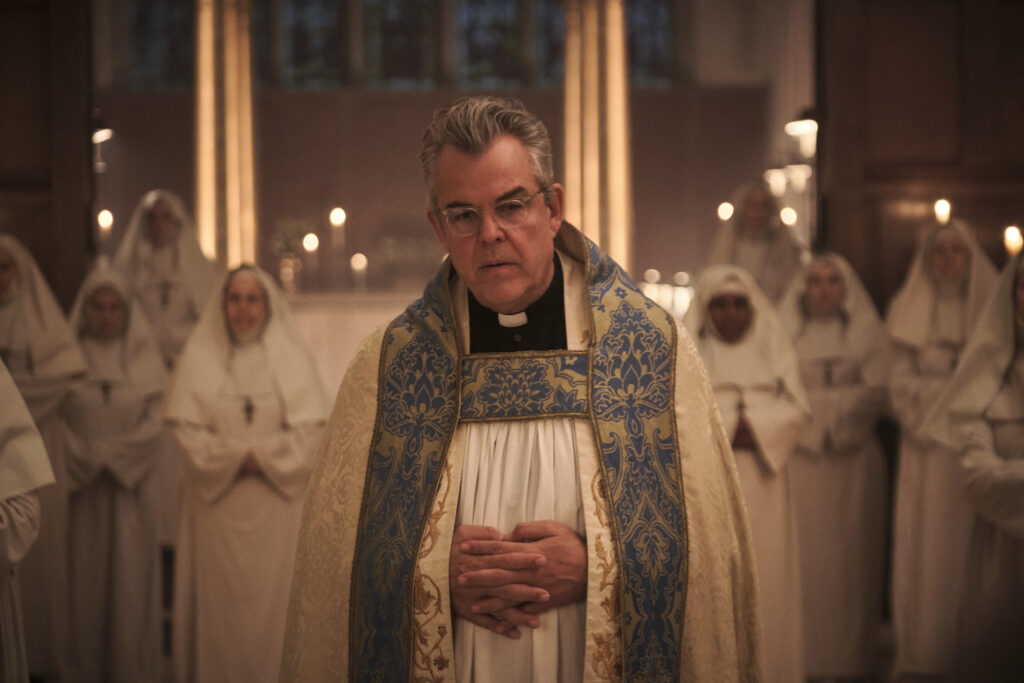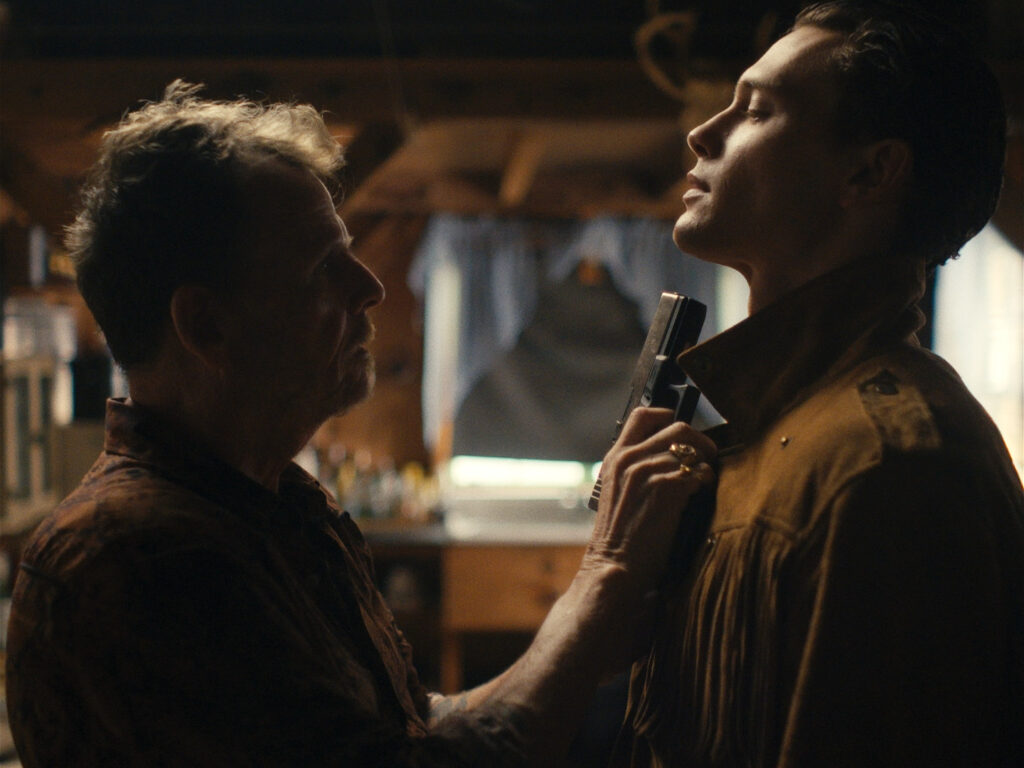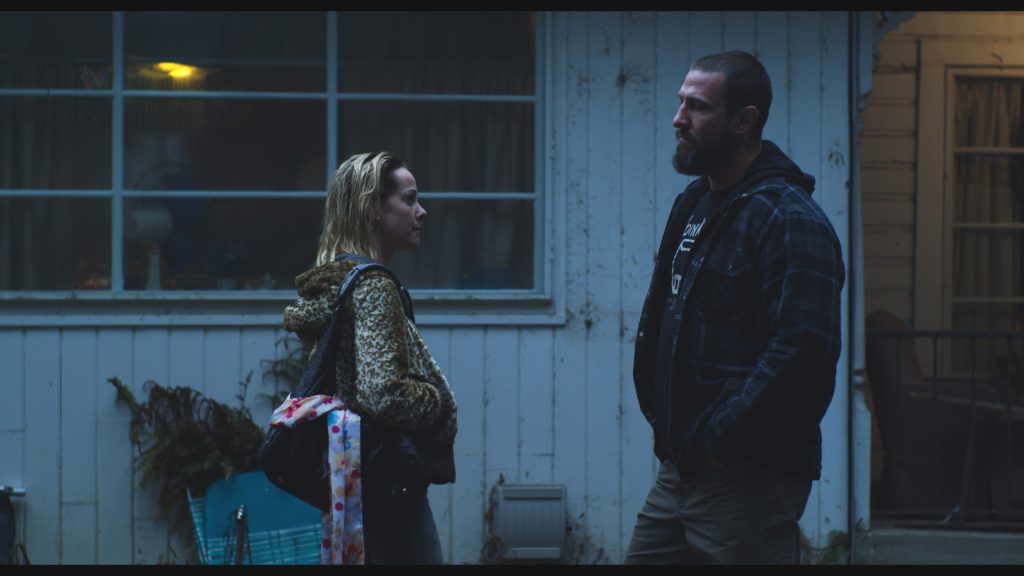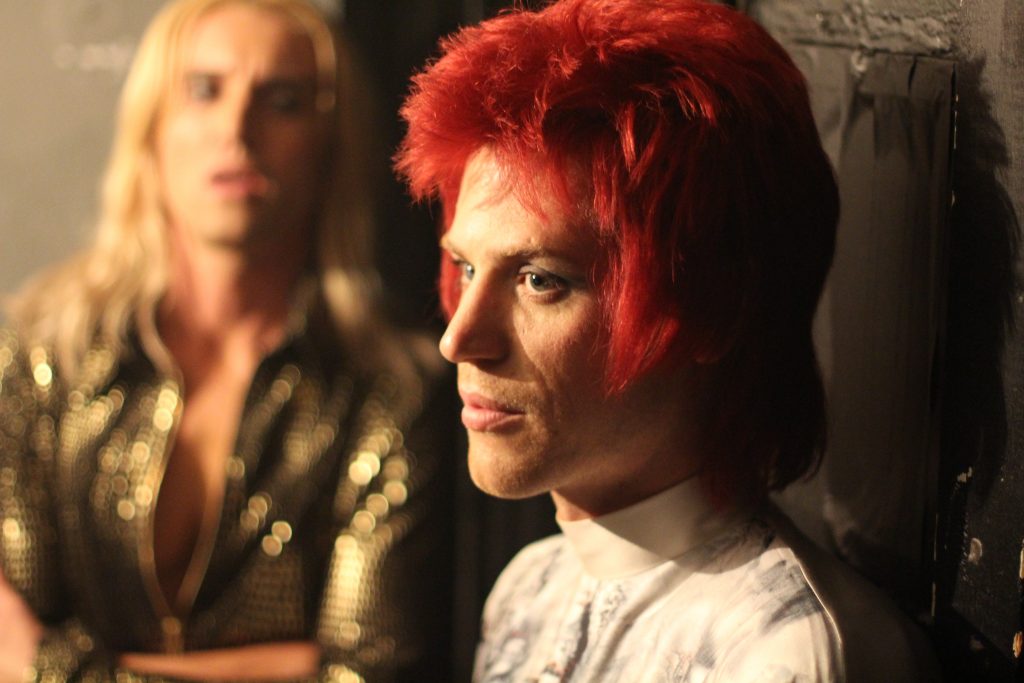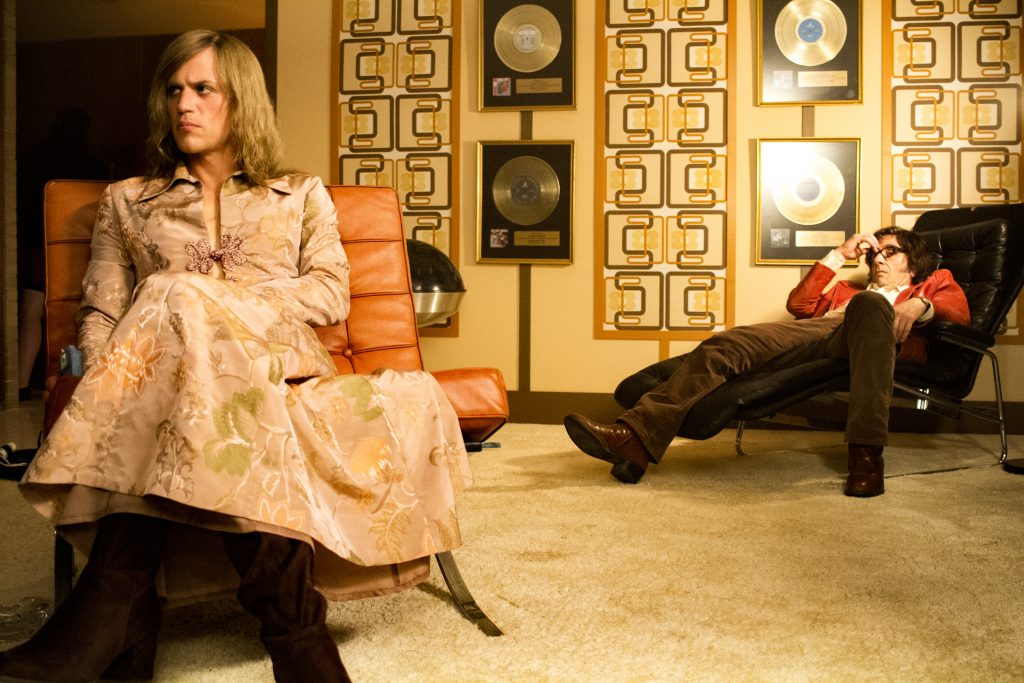March 16, 2024
by Carla Hay
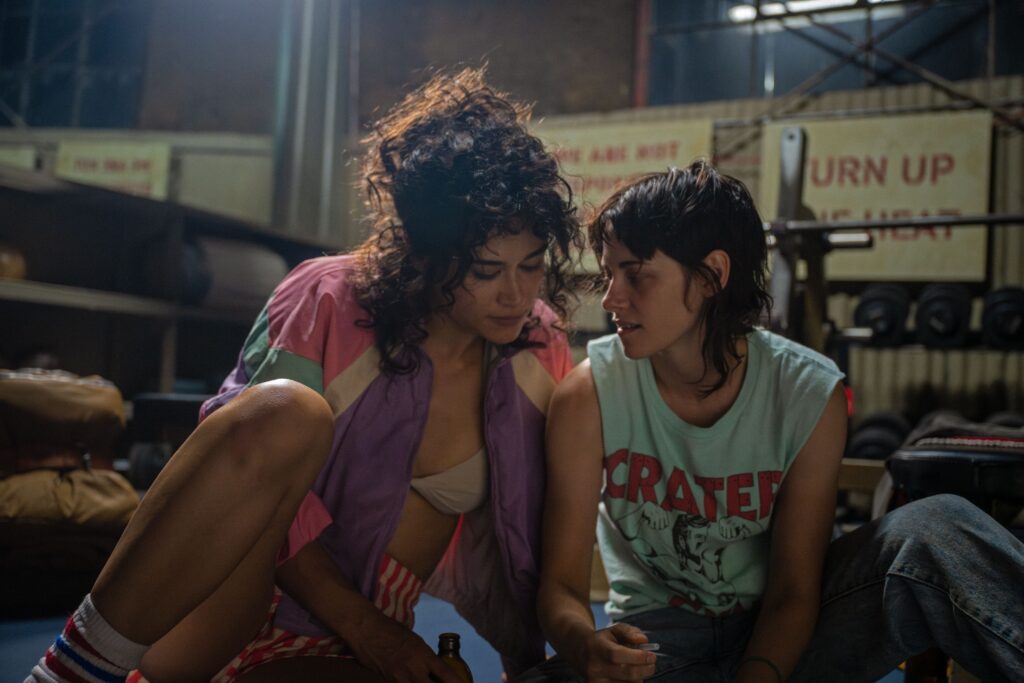
Directed by Rose Glass
Culture Representation: Taking place in an unnamed city in New Mexico (and briefly in Las Vegas), the dramatic film “Love Lies Bleeding” features a predominantly white cast of characters (with a few Latin people and African Americans) representing the working-class, middle-class and criminal underground.
Culture Clash: A gym employee and an aspiring professional bodybuilder meet, fall in love, and get involve in deadly criminal activities.
Culture Audience: “Love Lies Bleeding” will appeal primarily to people who are fans of star Kristen Stewart and intense movies about outlaw lovers.
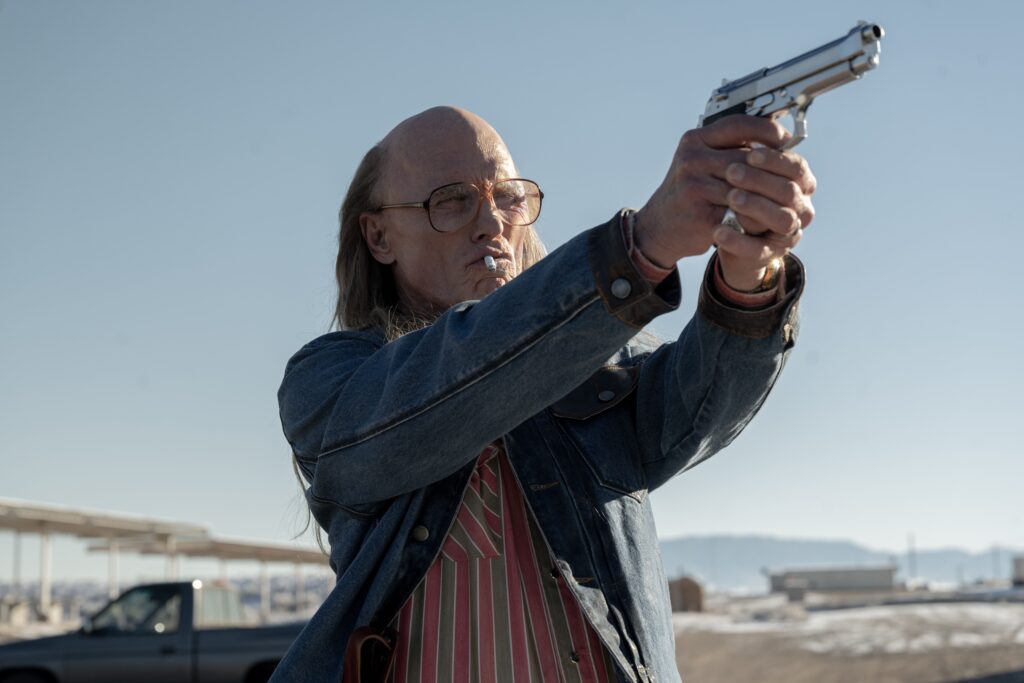
Gritty and suspenseful, “Love Lies Bleeding” is a rollercoaster ride of a crime drama that has unexpected moments of fantasy and horror, along with a co-dependent love story between two women. The outcome of this love story is intended to be as impactful as the results of all the murder and mayhem that take place in this intense thriller. It’s a well-acted and artfully made film about desperation, revenge and the lengths that people will go to in order to fulfill ambitions or protect loved ones.
Directed by Rose Glass, “Love Lies Bleeding” was co-written by Glass and Weronika Tofilska. The movie had its world premiere at the 2024 Sundance Film Festival. “Love Lies Bleeding” is the second feature film from Glass, who made her feature-film directorial debut with the 2020 horror movie “Saint Maud,” a story about a fanatically religious and mentally ill woman.
There are some elements in “Love Lies Bleeding” that are similar to “Saint Maud,” particularly when twisted horror-like hallucinations of a main character seem to come to life. However, both movies are very different from each other overall. “Love Lies Bleeding” is not for people who are easily offended by bloody gore or explicit sexual content. “Love Lies Bleeding” is an above-average noir thriller that brings some unique twists to what’s usually seen in movies about outlaw lovers.
“Love Lies Bleeding” takes place in 1988, mostly in an unnamed small city in New Mexico, where the movie was filmed. The movie’s opening scene is at a grungy local fitness studio called Crater Gym, where gym employee Louise “Lou” Langston (played by Kristen Stewart) does menial tasks, such as attending to customers and doing janitorial duties. A co-worker named Daisy (played by Anna Baryshnikov) has an obvious crush on Lou and tries to get Lou to go on a date with her, but Lou politely rejects Daisy’s advances.
Lou, who is in her early 30s, is an introverted loner who is a chronic smoker and lives with a cat. She’s the type of person who will listen to anti-smoking audio recordings, perhaps as a way to try to quit smoking or as an ironic way of rebelling against what the recordings are saying. During the course of the movie, more of Lou’s background and her family are revealed.
Lou’s father Lou Langston (played by Ed Harris), also known as Lou Sr., is a scummy and ruthless crime lord who lives in a mansion and owns a gun club as a way to launder money. Lou’s mother has been missing for the past 12 years. Lou won’t come right out and admit it, but she’s pretty sure that her mother is dead, and she suspects her father had something to do with this disappearance. Lou is estranged from her father for this reason and many other reasons.
Lou is closest to her older sister Beth (played by Jena Malone), a married mother of three sons. Lou despises Beth’s husband JJ (played by Dave Franco), because JJ is very abusive (physically and emotionally) to Beth, who won’t get help for this problem out of fear and loyalty to JJ. JJ works at Lou Sr.’s gun club and is involved in Lou Sr.’s criminal activities.
One day, a stranger comes to town who will capture Lou’s attention and Lou’s heart. Her name is Jackie (played by Katy O’Brian), an aspiring professional bodybuilder, who has arrived from Oklahoma. Jackie, who is also in her 30s, is passing through New Mexico on the way to a bodybuilder competition in Las Vegas. She visits Crater Gym to work out. And it’s at Crater Gym where Lou first sees Jackie and has an instant attraction to her.
Before Lou and Jackie meet, Jackie has a sexual hookup with JJ in his car because she heard that JJ works at a gun club and hopes that he can help her get a job there. Sure enough, after their sexual encounter, when Jackie asks JJ if there are any job openings where he works, he gives her a business card and says yes and tells her that he’ll put in a good word for her. At the gun club, JJ introduces Jackie to Lou Sr., who hires her as a waitress, because she says she doesn’t like being around guns.
Shortly after Lou and Jackie meet and flirt with each other at the gym, they become lovers. Jackie soon shows herself to be a skilled hustler, because she charms Lou into letting Jackie temporarily live with Lou until Jackie goes to Las Vegas. Lou is not happy at all when she finds out that Jackie is working at the gun club. She comes right out and tells Lou that Lou’s father is a “psycho,” but she says that Jackie is free to work wherever she wants.
Jackie tells Lou a little bit about her background. Jackie says she was adopted at age 13, and she used to be a “fat kid,” who was bullied. Jackie also hints that she is estranged from her family when she says she doesn’t really have anyone who supports her bodybuilder dreams—a fact confirmed in a later scene when Jackie calls her adoptive mother. More details eventually emerge about Jackie’s troubled past.
Lou finds out that Jackie and JJ hooked up after JJ tells Lou about it during an argument that he has with Lou. When Lou angrily confronts Jackie about it, Jackie (who says she is bisexual) admits to hooking up with JJ. Jackie is able to smooth things over with Lou, because Jackie says that the sex with JJ was meaningless and only happened because she used JJ to get a job. Jackie also reminds Lou that she hooked up with JJ before Jackie met Lou.
Even though Lou is a quiet introvert and Jackie is a talkative extrovert, they both know without saying it out loud that they are both emotionally damaged from family problems. It’s a big reason why they are attracted to each other but also why they develop a dangerous co-dependent relationship. Soon after they become lovers, Lou offers Jackie free steroids, which Jackie is reluctant to take, but she gives in to Lou’s pressure to let Lou inject Jackie with the steroids. Jackie then becomes hooked on using steroids.
It’s hinted that Jackie’s steroid abuse could be the cause of Jackie’s hallucinations where her muscles become abnormally enlarged and she sees herself as turning into the size of the Incredible Hulk. There are other hallucinations she has that are pure grotesque horror. But observant viewers will notice that Jackie’s steroid abuse might not be the only reason for her delusions, as she appears to have some type of undiagnosed mental illness.
It’s enough to say that Jackie and Lou get caught up in murder and desperate cover-ups. Even before this happened, Lou was already on edge because two FBI agents working together—one named William O’Riley (played by Orion Carrington) and one named Dave (played by Matthew Blood-Smyth)—have her under surveillance. FBI agent O’Riley approaches Lou at the gym to question her about her father and her mother. Lou says she no longer speaks to her father and has no information about where her mother is.
“Love Lies Bleeding” has a lot of familiar storytelling about crime, betrayals and revenge. However, it’s not very often that these stories are told in movies from the perspectives of queer women characters, one of whom happens to be a bodybuilder. Lou and Jackie go to many extremes out of an underlying desperation and unhappiness that they have about their lives. There are clues about this discontent throughout the movie, such as when Lou seems to enviously admire Jackie for traveling to Las Vegas by herself, because Lou has never been anywhere outside of her small city. Jackie has convinced herself that becoming a rich and famous bodybuilder will make her own life happy and fulfilled.
Stewart has made a career out of playing fidgety and insecure characters. She gives one of her better performances as this type of character in “Love Lies Bleeding.” O’Brian has the harder and more complex role as Jackie, who will keep viewers guessing about how “good” or “bad” Jackie really is. Harris, Franco and Malone handle their roles capably, although their respective characters in “Love Lies Bleeding” are not very well-developed. Baryshnikov doesn’t have a lot of screen time, but she skillfully portrays Daisy, who is not as ditsy as she first appears to be.
“Love Lies Bleeding” has a few things that require suspension of disbelief. For example, if Lou Sr. is such a powerful crime lord, then there would be more than just two FBI agents snooping around. But this factual flaw can be overlooked because “Love Lies Bleeding” is a low-budget movie and the story is focused more on the relationship between Lou and Jackie than on any law enforcement investigating any crimes. “Love Lies Bleeding” doesn’t pass judgment on all the awful and cruel things that happen in the movie, but instead invites viewers to ponder if all of this destruction is worth it in the name of love.
A24 released “Love Lies Bleeding” in select U.S. cinemas on March 8, 2024, with an expansion to more U.S. cinemas on March 15, 2024.


